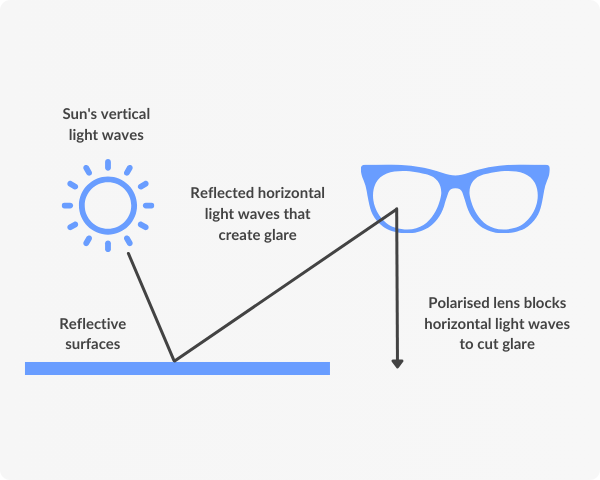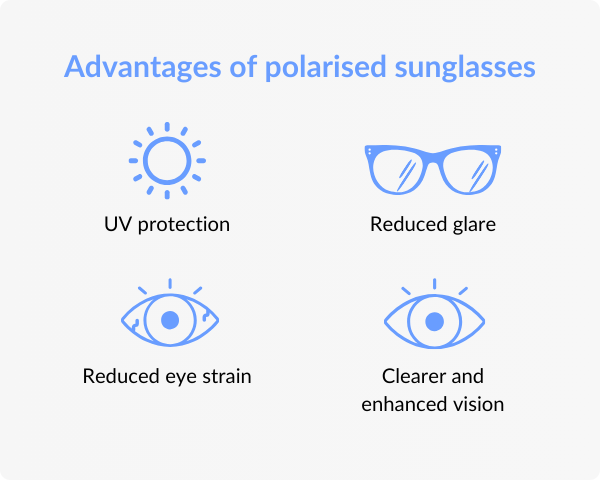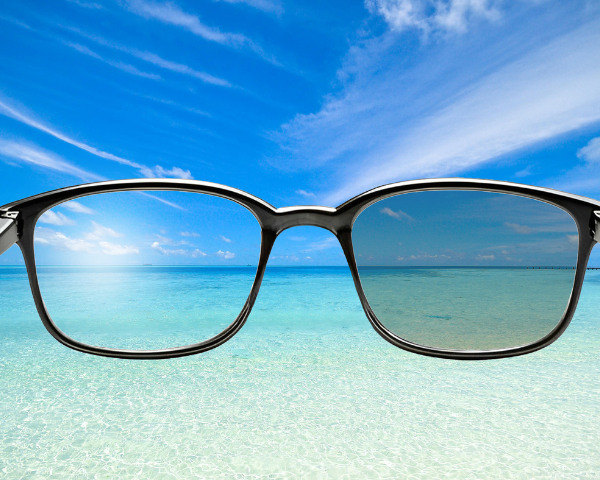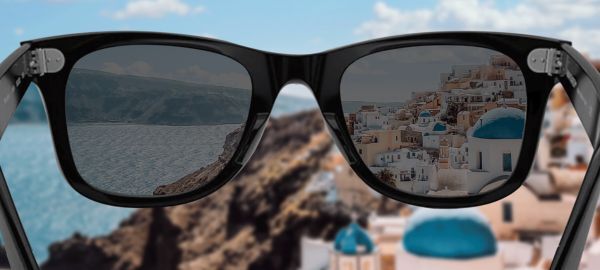Polarised Sunglasses: a Must-Have for Outdoor Activities

Reviewed by
Beck Jinnette
If you’ve ever been dazzled by blinding glare while enjoying the great outdoors, it would be worth your while to consider investing in a pair of polarised sunglasses.
Whether you’re driving down a sunlit road or going hiking in the mountains, polarised lenses can make all the difference between a squinty, uncomfortable experience and one where you’re fully present in the moment.
In this article we’ll look into how these innovative lenses work and why they might just become your new favourite accessory.
What are polarised sunglasses?
Think of polarised sunglasses as your personal light filter.
Polarised lenses are designed to filter out horizontal light rays, which are commonly found on reflective surfaces like snow, sand and water, reducing glare and enhancing contrast to better protect eyes. They’re a stark contrast to non-polarised lenses, which lack this glare-reducing feature.

What makes them so good for outdoor activities?
Polarised sunglasses for sports and outdoor use have become a crucial part of athletes’ and adventurers’ gear. Let’s look at why.
Glare reduction
Whether you’re out at sea or taking a curve on a mountain road, polarised lenses help reduce glare so you can keep your eyes on the prize—safely and comfortably.
Reduced eye strain
Being outside, surrounded by bright sunlight, your eyes can get tired and begin to hurt from eye strain. Polarised lenses help reduce the tension and let you enjoy your time in the sun freely.
Clearer & enhanced vision
Polarised sunglasses can significantly improve your visual experience since their dimming effect sharpens your sight by filtering out excess light.
UV protection
Many – but not all – sunglasses brands offer polarised lenses that block out UVA and UVB rays. Make sure to check the specifications of your glasses to ensure your eye health every time you step outside.

DID YOU KNOW?
Glare can be more intense during winter as the sun sits at a lower angle, creating more pronounced reflections.
When to wear polarised sunglasses
After learning the benefits of polarised lenses, let’s take a look at the activities where they take the spotlight.
Daytime driving
When you’re driving during the day, the sun can bounce off the road and other cars, making it hard to see.
Wearing polarised sunglasses for everyday wear helps to block the sun rays and provide a clearer view of the road, so you can drive more safely.
Water activities
For those who love fishing and boating, polarised lenses are a game-changer because they reduce the glare from the water’s surface, making it easier to see what’s below it.
And if you’re lounging on the beach or playing volleyball, these glasses help cut out the glare from the sand and water, so you can enjoy the summer days even more.

Outdoor sports
Golfers often find that polarised sunglasses help them see the fairways better and spot golf balls better, especially if they land in the water.
And if your outdoor activity of choice is running or biking, these sunglasses greatly reduce the glare from the roads, so you can keep your eyes on what’s ahead of you. This helps you stay safe and enjoy your sport, even when the sun is beaming down.
Snowy environments
White snow can create blinding glare which can be cut down by polarised lenses. However, skiers sometimes need that glare to recognise icy patches on the slopes.
If you’re going skiing, snowboarding or mountaineering, a mirror coating on the front surface of polarised sunglasses is a secure option to enhance your comfort and visibility.

Understanding the setbacks of polarised sunglasses
Even though polarised sunglasses bring many benefits for outdoor enthusiasts, there are some drawbacks that need to be considered.
Reduced visibility on LCD (liquid crystal display) screens
Polarised sunglasses can affect visibility on digital screens which could pose a problem for motorcycle riders relying on dashboard displays or pilots needing clear instrument readings during flight.
Reduced depth perception
Polarised lenses block out certain types of light which can change the way our brain interprets the differences in light and shadows making it harder for some people to judge distances.
This can make it challenging for some people to accurately gauge how far away objects are, an essential skill in golfing and mountain biking.
Unsuitable for nocturnal activities
Polarised lenses reduce visibility in low-light conditions, potentially making it harder to see obstacles while night running or night cycling.
In this case, non-polarised glasses or specialised sports glasses are better options to ensure clearer vision in the dark.
Make the most of the outdoors with polarised sunglasses
Whether you’re driving, participating in water and snow activities or simply enjoying a sunny day, polarised sunglasses remain a must-have for visual clarity and comfort while minimising glare and – often – protecting from UV rays.
If you have any questions about polarised lenses or any eyecare-related concerns, feel free to reach out to one of our certified optical dispensers using the link provided at the top of the page.
Related articles


Related articles






































